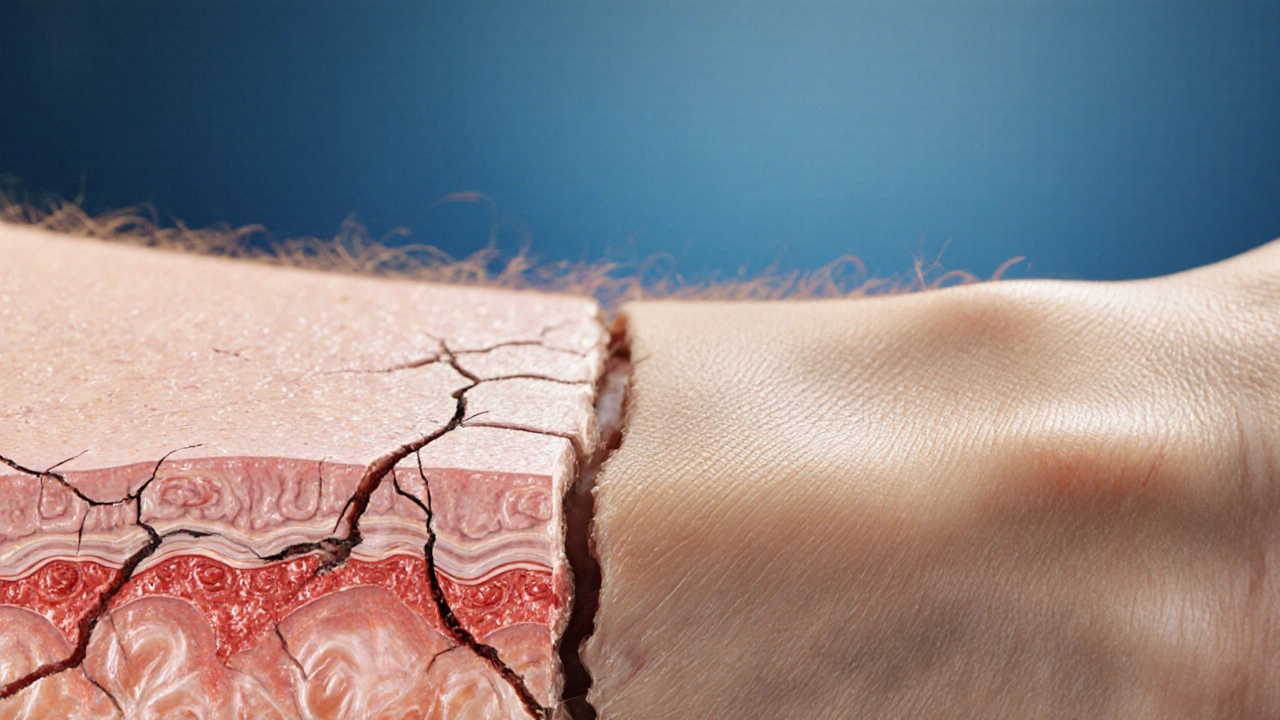Skin care made simple: practical tips for dry, itchy, and aging skin
Do you wake up with flakey patches or constant itch? Skin problems are annoying, but small habit changes fix a lot. Below you'll find clear steps you can use today, plus when to seek medical help and where to find affordable meds or trusted info.
Daily routine that actually helps
Start with a gentle cleanser—no harsh soaps. Use a fragrance-free, pH-balanced product and wash with lukewarm water. Pat dry instead of rubbing. Right after drying, apply a moisturizer while your skin is still slightly damp to lock in hydration.
Choose a moisturizer based on your skin: a lightweight lotion for oily skin, a cream for normal to dry skin, and an ointment (like petroleum) for very dry or cracked areas. For older adults, look for products with ceramides or glycerin; these support the skin barrier and reduce itch.
Sunscreen matters every day. Broad-spectrum SPF 30 shields from aging and darker spots. Put it on even on cloudy days and reapply after sweating or swimming.
Cut hot showers to once a day or shorter than ten minutes. Hot water strips oils and makes dryness worse. Swap harsh scrubs for a soft washcloth or a mild chemical exfoliant once or twice a week if needed.
Easy fixes for common problems
Itchy, dry skin: Try a thick moisturizer or body oil after bathing. Use a humidifier in winter and wear breathable cotton clothing. If itching wakes you at night, a night application of an emollient can help.
Red patches or eczema: Avoid known irritants like wool or heavily scented products. Over-the-counter hydrocortisone can calm flare-ups for short periods, but don't use it long-term without medical advice.
Acne and breakouts: Cleanse gently, avoid heavy creams on the face, and look for non-comedogenic labels. Benzoyl peroxide or salicylic acid treatments work well for many people—start slowly to avoid irritation.
Skin aged by sun or smoking: Quitting smoking improves skin color and slows wrinkling—many people notice better tone within months after quitting. Using antioxidants such as vitamin C serum and daily sunscreen reduces further damage.
Costs and where to look: If a prescription is needed, compare options before buying. Our site covers affordable pharmacies and safe buying tips so you can find legit options without overspending.
When to see a doctor: See a clinician if you have sudden spreading redness, painful swelling, fever, non-healing sores, or rapid hair loss. Also get help if OTC treatments don't ease a persistent problem.
Small steps add up. Stick to a gentle routine, protect your skin from sun, and treat flare-ups early. If you want specific product suggestions or links to our detailed guides, check the tag feed for targeted articles on itchy skin, quitting smoking benefits, and skin-friendly medications.
Bookmark this tag and browse our skin care articles for step-by-step guides. Subscribe for quick updates. If you're unsure about a treatment or need help finding an affordable prescription, contact us and we'll help you choose safely today.
Top 10 Eczema Myths Debunked - Facts You Need to Know
- Robin Tudge
- October 10, 2025
- 15 Comments
Debunk the top ten eczema myths with clear facts, practical tips, and expert‑backed explanations to help you manage symptoms effectively.
read moreDiscover Top 5 Acne Treatments: Effective Alternatives to Isotroin in 2025
- Robin Tudge
- January 8, 2025
- 18 Comments
Exploring new ways to treat acne is pivotal in 2025. As Isotroin faces competition from various alternatives, options like Adapalene, Salicylic Acid, and Spironolactone are gaining ground. Each offers distinct benefits and side effects, sometimes available over-the-counter and sometimes requiring prescriptions. Understanding these alternatives helps in selecting the best treatment path suited for individual skin needs.
read more

